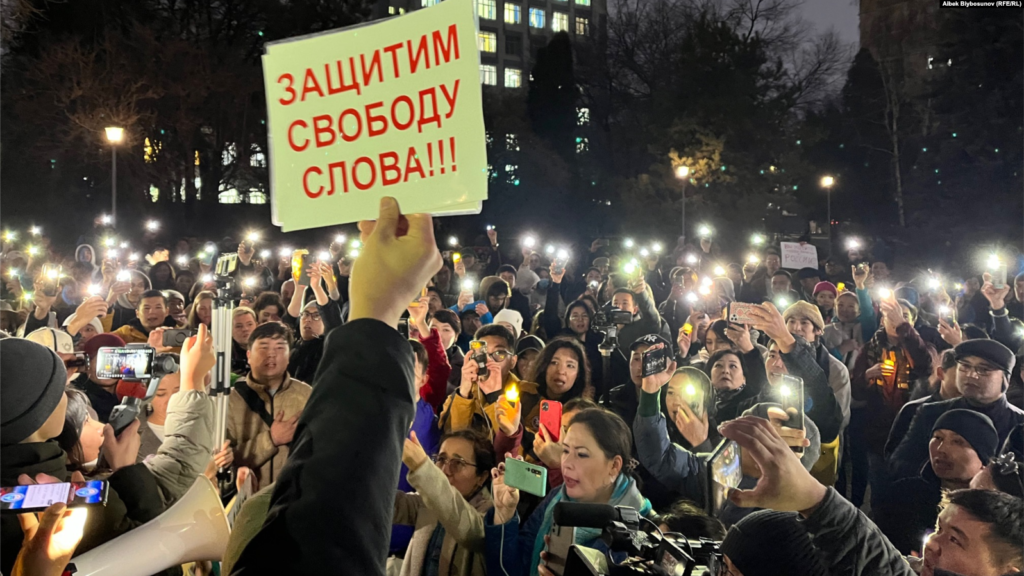The Kyrgyz government made the decision on October 26 after RFE/RL refused to take down a video of one of its news programs that reported on clashes at the border with Tajikistan.
The government claimed the video, produced by Current Time, the Russian-language network run by RFE/RL in cooperation with VOA, “predominantly” took the position of the Tajik side.
The decision was based on the Law on Protection from False Information, a piece of legislation that drew widespread criticism when adopted in August last year.
RFE/RL President and Chief Executive Officer Jamie Fly rejected the accusation, saying the broadcaster “takes [its] commitment to balanced reporting seriously” and that after a review of the content in question, “no violation of our standards” was found. RFE is appealing the decision.
In solidarity with RFE/RL, independent Kyrgyz media outlets on October 28 posted a black screen on their web pages from 0900 to 1200 local time with the caption: “No News Today. Media Under Pressure In Kyrgyzstan,” and also refused to cover news stories about the government for the whole day.
Among the participants in the boycott were Kaktus.media, Kloop.kg, 24.kg, T-Media, TV1, NEXT TV, 3rd channel, April TV, Bulak.kg, Politklinika.kg, TemirovLive, and media MediaHub.
“The Ministry of Culture and Information of Kyrgyzstan made an illegal decision to suspend the website of Radio Azattyk. The media community of Kyrgyzstan calls on the authorities to stop the pressure on freedom of speech and the freedom of the press and the criminal prosecution of journalists, bloggers, civil activists, and other citizens who freely express their opinions,” the media community said in a statement.
The Kyrgyz government’s decision was criticized by rights groups and Kyrgyz lawmakers; rights activists who have called for the government to repeal it.
Human Right Watch (HRW) on October 28 urged the Kyrgyz authorities to rescind the measure against RFE/RL, saying in a statement that Kyrgyzstan “should stand up for, not undermine,” independent media.
“It is standard journalistic practice to provide information from both sides of the conflict,” said HRW’s Syinat Sultanalieva.
“The blockage of [Radio Azattyk] is a blatant attempt to control and censor independent journalism in Kyrgyzstan in violation of the country’s international human rights obligations, particularly with respect to freedoms of expression and of the media,” Sultanalieva said.
On October 27, the Committee to Protect Journalists (CPJ) called the move against RFE/RL “a flagrant act of censorship.”
“Kyrgyz authorities must immediately lift the block on Radio Azattyk and repeal the [Protection from False Information Law], which gives state officials carte blanche to quash inconvenient reporting through wholly opaque decisions on alleged ‘inaccuracy’,” CPJ said in a statement.
On October 27, dozens of Kyrgyz media outlets published an open letter calling on the Kyrgyz government to immediately cease all pressure on freedom of speech and freedom of the media and to withdraw the Protection from False Information Law.
Earlier this month, threats were made against RFE/RL journalists during a demonstration in Bishkek at the office of RFE/RL’s Kyrgyz Service. Most of the participants of the action covered their faces, avoided the camera, and refused to answer questions about their demands.
Ilimbek Israilov, the organizer of the demonstration, threatened to spray gasoline on RFE/RL reporters and use force against them. Israilov is known for his involvement in the organization of numerous rallies to support the former deputy chief of the Customs Service, Raimbek Matraimov.
In 2019, an investigation by RFE/RL, the Organized Crime and Corruption Reporting Project, and Kloop implicated former deputy chief of the Customs Service Raimbek Matraimov in a corruption scheme involving the transfer of hundreds of millions of dollars out of Kyrgyzstan.
Source: RFERL


